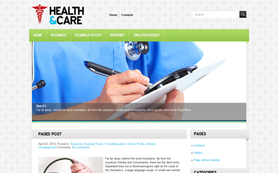Why Does WordPress SEO Matter?
Starting with WordPress SEO can be intimidating, especially if you're a small business owner managing your website. However, optimizing your website for search engines is crucial. It can improve traffic, visibility, and money. With a little DIY spirit and expert guidance, you can transform your WordPress site into an effective marketing tool.
How Can You Get Started with WordPress SEO?
Establishing the Foundation
Before you go into specific methods, make sure your WordPress setup is solid. Select a reputable hosting provider, utilize a clean, SEO-friendly WordPress theme, and install necessary plugins such as Yoast SEO or All in One SEO Pack.
WordPress SEO Consultancy might be expensive, but by taking these first steps, you're laying the groundwork that many consultancies would use.
What Are the Essential Elements of an SEO-Friendly WordPress Website?
Keyword Research:
Start with keyword research. Google Keyword Planner, Ahrefs, and SEMrush are all tools that can help you uncover terms that your potential clients are searching for. Aim for a combination of head terms and long-tail keywords that are relevant to your business.
On-page SEO:
Optimize your content naturally with target keywords. Every page should have a distinct title tag and meta description. Include your major keyword in the title, meta description, headings, and body of the text, but avoid keyword stuffing. Use header tags (H1, H2, H3) to arrange your content and make it easier for visitors and search engines to read.
WordPress SEO Audit:
Conduct regular audits of your site to check that everything is working properly. Screaming Frog and Ahrefs are two tools that can help you uncover issues like broken links, duplicate content, and sluggish page performance.
How Can You Improve Technical SEO for Your WordPress Website?
Website Speed:
Fast-loading websites rank higher. To speed up your site, optimize pictures, utilize a caching plugin such as W3 Total Cache, and consider using a content delivery network (CDN).
Mobile optimization:
Ensure that your website is mobile-friendly. With Google's mobile-first indexing, responsive design is critical. Test your website on a variety of devices and screen sizes to ensure a positive user experience everywhere.
Structured data:
Use structured data (Schema.org) to assist search engines in better understanding your content. This can improve your search results by including rich snippets, thereby raising your click-through rate.
What Role Does Content Play in WordPress SEO?
Quality Content:
Focus on producing high-quality, informative material that meets the demands of your target audience. Maintain a consistent flow of new content on your blog. Content that adds value, answers questions and solves issues typically performs highly in search engines.
Internal Linking:
Use internal links to help visitors navigate your website and enhance crawlability. Link related content together and ensure each page is only a few clicks away from the homepage.
WordPress SEO Expert Tip:
Creating cornerstone content (in-depth articles on important topics) will boost your site's authority and increase rankings for related keywords.
How Important Are Backlinks for WordPress SEO
Backlinks are important for SEO. Aim for high-quality links from credible websites. This can be accomplished by guest posting, forming partnerships, or providing material that others want to link to.
Monitor your backlink profile with tools such as Ahrefs and SEMrush. Avoid any spammy or low-quality links that may hurt your SEO.
Tracking SEO Efforts and Google Analytics:
Set up Google Analytics and Google Search Console to track your website's performance. Monitor critical data such as organic traffic, bounce rate, and conversion rate. Review your site's analytics on a regular basis to determine what works and what needs to be improved.
Create monthly SEO reports to monitor progress. Consider measures such as keyword ranks, traffic, and backlink growth. This aids in identifying trends and making data-driven decisions.
What are some common WordPress SEO pitfalls to avoid?
Avoid keyword stuffing
Overuse of keywords can affect your SEO. Write naturally with a focus on user experience.
Beware of Duplicate Content
Ensure that each page contains distinct material. Use canonical tags to deal with duplicate content concerns.
Do Not Ignore Technical SEO:
Technical considerations such as site performance, mobile optimization, and organized data are critical. Neglecting them can undermine your SEO efforts.
Expert Opinions and Real-life Examples
To bring this guide to life, consider a real-world example. Jane, a small business owner, optimized her WordPress site using these procedures. Initially, her site had few visitors. After conducting a full WordPress SEO analysis, she restored broken links, increased site speed, and launched a blog focused on long-tail keywords. Within six months, her organic traffic doubled, and her revenue increased significantly.
Experts believe that, while tools and plugins are useful, understanding the fundamentals of SEO and continually updating your knowledge is critical. Stay up to date on new trends and updates by engaging with the SEO community, attending webinars, and reading the most recent publications.
Why Should Small and Medium-Sized Enterprises Care About WordPress SEO?
Small and medium-sized businesses (SMEs) operate in a highly competitive market. A strong internet presence is not only useful but also necessary for these businesses. WordPress SEO enables SMEs to level the playing field with larger competitors by using the power of search engine optimization.
SEO enables SMEs to boost their presence on search engines such as Google. When potential clients look for the products or services that your company provides, appearing on the first page of search results boosts their chances of accessing your website. Higher visibility translates to a wider reach and the possibility of more customers discovering your business.
Cost-effective marketing
Traditional marketing strategies are costly, which can be a hurdle for SMEs with restricted funds. WordPress SEO is an affordable method that can yield long-term effects. Once your site is properly optimized and begins to rank better in search results, it will continue to draw organic traffic without incurring the recurring expenditures associated with paid advertising.
Building Credibility and Trust
Users tend to consider websites that rank higher in search results as more reputable and trustworthy. By optimizing your WordPress site, you may position your company as an industry leader. High-quality content, good user experiences, and powerful backlinks all help to increase trust with search engines and potential customers.
Enhancing the User Experience
Good SEO tactics are inextricably linked to better user experiences. Fast loading times, mobile-friendly design, and simple navigation not only satisfy search engines but also improve the entire user experience. Happy visitors are more likely to become repeat clients, and they are also more likely to tell others about their pleasant experiences.
Staying Competitive
In today's digital landscape, failing to invest in SEO means slipping behind the competition. Many firms, including your competitors, have already started investing in SEO. By disregarding SEO, you risk losing crucial traffic and sales to competitors who are constantly optimizing their websites. Keeping up with SEO best practices ensures that you remain competitive and attract new customers.
One of the key benefits of WordPress SEO is the ability to reliably measure results. Google Analytics and Search Console are two tools that provide precise information about how your site is performing. You may monitor data like organic traffic, bounce rates, and conversion rates. This data enables you to fine-tune your methods and make more educated decisions to improve the performance of your website.
Local SEO Benefits
Local SEO is very critical for small and medium-sized enterprises. By optimizing your WordPress site for local searches, you can ensure that your business shows in location-based searches. This is especially important for firms that rely on local clients. Implementing local SEO methods, such as improving your Google My Business profile and including local keywords, can increase local traffic to your website.
Consumer behavior has evolved significantly toward online research and purchase. A solid SEO strategy guarantees that your company is visible where your clients are searching. Understanding and adjusting to these developments enables SMEs to attract more qualified leads and expand their customer base.
Real-Life Success Story: From Local Store to Online Powerhouse
Consider the example of "The Little Bookstore," a small local bookshop that faced stiff competition from large retail corporations. They optimized their website, focused on local SEO, and updated their blog on a regular basis with compelling content on book reviews and literary events using a robust WordPress SEO strategy. Within a year, their organic traffic had climbed by 150%, and they were attracting clients from surrounding towns. Their internet sales increased their revenue, and their local store experienced increased foot traffic as a result of enhanced online presence.
Final Words
DIY WordPress SEO is an achievable effort for small business owners. With a clear approach, the correct tools, and consistent effort, you can increase your site's visibility and traffic. Remember that SEO is a long-term investment. Stay patient and consistent, and you will see results.
 Members Area
Members Area




